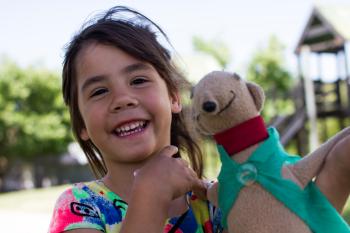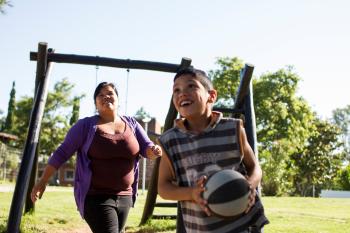Poverty is not highly visible in Montevideo, but it exists and affects thousands

Little girl in Montevideo (photo: S. Verhaert)
Over 100,000 people in Montevideo are estimated to live in so-called “cantegriles” – shantytowns on the outskirts of the city that lack basic infrastructure, where people live in precarious, makeshift housing. Most people here are rural migrants who have come to the city in search of work and a better life but, more often than not, the reality they face stands in stark contrast to these dreams.
Children from the poorest families need support and encouragement
Despite the comparatively low rates by Latin American standards, there are nevertheless around 50,000 unemployed people in Montevideo, and approximately 24,000 people living below the national poverty line, unable to meet basic needs such as an adequate diet. Children are most severely affected by this situation: almost 60 per cent of children between the ages of 5 and 17 in Uruguay belong to the poorest sectors of society.
Growing up in such conditions can have grave effects on a child’s healthy physical and psychological development. A childhood of deprivation can severely hamper a child’s self-esteem, which can lead to unfulfilled potential and underachievement as an adult.
In addition, such children are incredibly vulnerable to sexual exploitation and child trafficking, especially in the border areas of the country. Though they may not be immediately visible in Uruguayan society, problems such as these continue to exist in the country.
Growing up in such conditions can have grave effects on a child’s healthy physical and psychological development. A childhood of deprivation can severely hamper a child’s self-esteem, which can lead to unfulfilled potential and underachievement as an adult.
In addition, such children are incredibly vulnerable to sexual exploitation and child trafficking, especially in the border areas of the country. Though they may not be immediately visible in Uruguayan society, problems such as these continue to exist in the country.
What we do in Montevideo
-68032_jpg.jpg?width=800)
Mother and child playing together (photo: S. Verhaert)
For children in Montevideo who are no longer able to live with their parents, SOS families can provide a loving home. In each family, the children live with their brothers and sisters, affectionately cared for by their SOS mother. In 2014 some families moved into housing in different districts throughout the town. Children are well integrated into the community as they go to the local schools and take part in neighbourhood activities.
When young people from the village feel ready to move out of the family home in order to pursue further education or vocational training our youth programme makes shared accommodation available to them. With the support of qualified counsellors, the young people live together and learn to take responsibility, plan for their future and prepare for independent adult life.
There is also an SOS Vocational Training Centre in Montevideo where SOS mothers and SOS co-workers receive training.